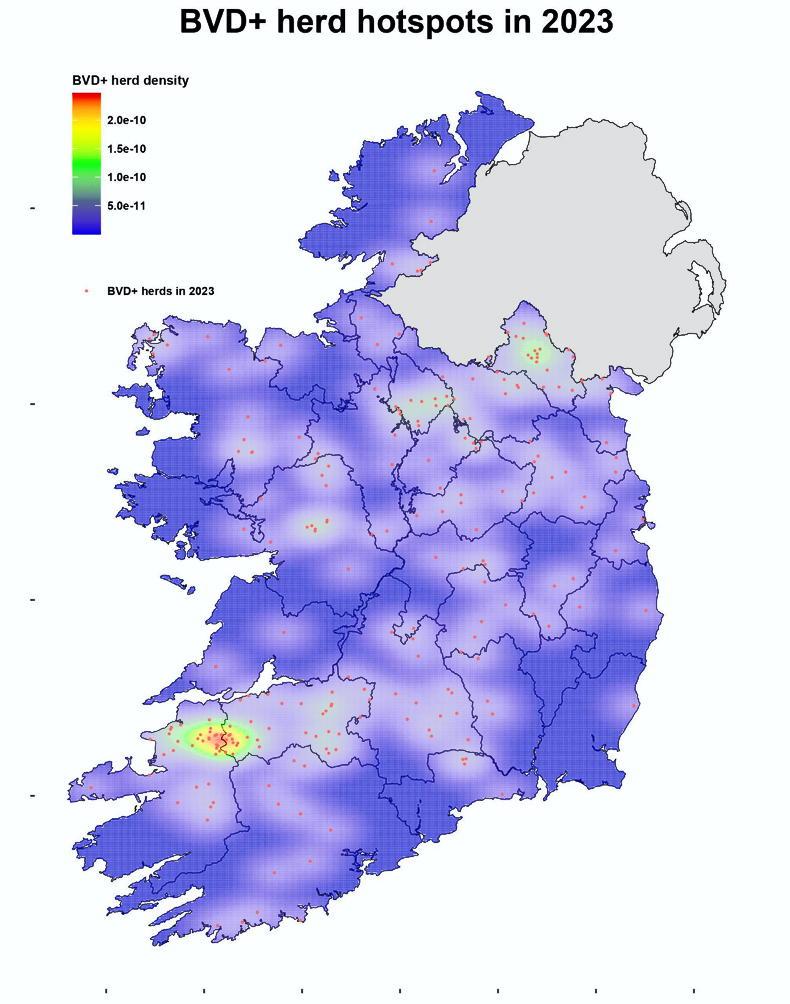Caution on BVD is being urged ahead of the breeding season - the highest-risk period for the disease - by Minister for Agriculture Charlie McConalogue.

BVD positive herd hotspots in 2013.

BVD positive herd hotspots in 2023.
In a statement, Minister McConalogue said Irish farmers have made “tremendous progress” towards eliminating BVD and that the disease’s eradication programme “is now at a critical point”.
“I am urging all farmers to be mindful of the importance of biosecurity practices, including attention to boundary fences, inward and outward movement of cattle, vaccination, the washing and disinfection of any shared machinery, equipment or facilities, to reduce the risk of infection so that we as a country can achieve BVD-free status, providing long-term benefit for livestock farmers,” he said.
The Minister added that as BVD prevalence reduces due to the eradication programme, so too does the natural immunity of the national herd to the virus.
This, along with decreased overall use of vaccination, places herds at an increased risk if infection enters it.
BVD entering a herd with reduced immunity can have a devastating impact and lead to the generation of further BVD persistently infected cattle, the Minister added.
Research
Research has identified that herds within 5km of positive cattle are at an increased risk, with the risk highest for those within 400m of positive herds.
In the past year, a small number of local clusters of infection have emerged, with infection having spread between herds. This is thought to result from the movement of animals, equipment and people.
The situation in the north Kerry-west Limerick area, which was a concern in 2023, has improved considerably in 2024.
Further research has shown that a BVD outbreak costs €63 per cow in dairy herds and €32 per cow in suckler herds.
In relation to BVD, Minister McConalogue also advised:
Herds that have BVD test-positive results in 2024 promptly engage with the BVD control programme, quickly remove all test-positive animals and complete the vaccination programme.Herds which had test positive cattle in 2023 complete their follow-up 2024 vaccination programme ahead of the breeding period. Herds that have been notified of BVD test positive cattle in their neighbourhood should seek advice from their veterinary practitioner, review their biosecurity practices, including vaccination policies and enhance these where needed.
Caution on BVD is being urged ahead of the breeding season - the highest-risk period for the disease - by Minister for Agriculture Charlie McConalogue.

BVD positive herd hotspots in 2013.

BVD positive herd hotspots in 2023.
In a statement, Minister McConalogue said Irish farmers have made “tremendous progress” towards eliminating BVD and that the disease’s eradication programme “is now at a critical point”.
“I am urging all farmers to be mindful of the importance of biosecurity practices, including attention to boundary fences, inward and outward movement of cattle, vaccination, the washing and disinfection of any shared machinery, equipment or facilities, to reduce the risk of infection so that we as a country can achieve BVD-free status, providing long-term benefit for livestock farmers,” he said.
The Minister added that as BVD prevalence reduces due to the eradication programme, so too does the natural immunity of the national herd to the virus.
This, along with decreased overall use of vaccination, places herds at an increased risk if infection enters it.
BVD entering a herd with reduced immunity can have a devastating impact and lead to the generation of further BVD persistently infected cattle, the Minister added.
Research
Research has identified that herds within 5km of positive cattle are at an increased risk, with the risk highest for those within 400m of positive herds.
In the past year, a small number of local clusters of infection have emerged, with infection having spread between herds. This is thought to result from the movement of animals, equipment and people.
The situation in the north Kerry-west Limerick area, which was a concern in 2023, has improved considerably in 2024.
Further research has shown that a BVD outbreak costs €63 per cow in dairy herds and €32 per cow in suckler herds.
In relation to BVD, Minister McConalogue also advised:
Herds that have BVD test-positive results in 2024 promptly engage with the BVD control programme, quickly remove all test-positive animals and complete the vaccination programme.Herds which had test positive cattle in 2023 complete their follow-up 2024 vaccination programme ahead of the breeding period. Herds that have been notified of BVD test positive cattle in their neighbourhood should seek advice from their veterinary practitioner, review their biosecurity practices, including vaccination policies and enhance these where needed.








 This is a subscriber-only article
This is a subscriber-only article











SHARING OPTIONS: